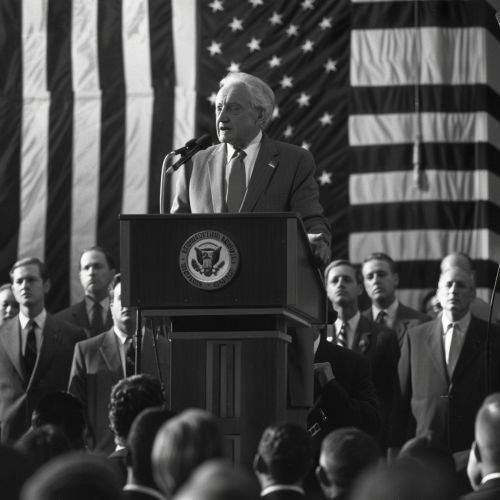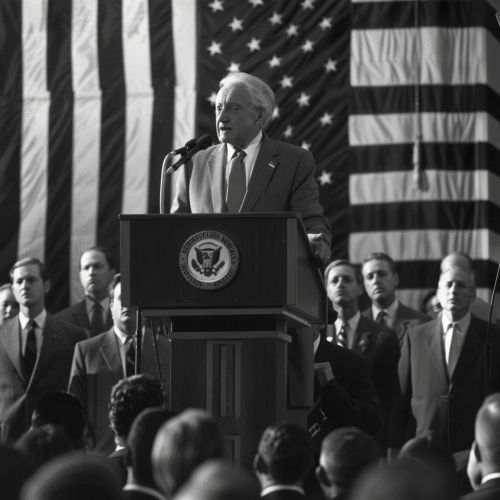Walter Mondale
Early Life and Education
Walter Frederick Mondale was born on January 5, 1928, in Ceylon, Minnesota. He was the son of Theodore Sigvaard Mondale, a Methodist minister, and Claribel Hope (née Cowan), a music teacher. Mondale's early years were marked by the values of public service and education instilled by his parents. He attended public schools in Elmore and Heron Lake, Minnesota, before graduating from Elmore High School in 1946.
Mondale went on to attend Macalester College in St. Paul, Minnesota, for two years before transferring to the University of Minnesota. He graduated in 1951 with a Bachelor of Arts degree in political science. During his time at the University of Minnesota, Mondale was involved in student politics and was a member of the Minnesota Democratic-Farmer-Labor Party (DFL). He then served in the United States Army from 1951 to 1953 during the Korean War. After his military service, Mondale returned to the University of Minnesota Law School, where he earned his Juris Doctor degree in 1956.
Early Political Career
Mondale's entry into politics was influenced by his work with the DFL and his connection to Minnesota's political figures. He served as a law clerk for Minnesota Supreme Court Justice Thomas F. Gallagher before entering private practice. In 1960, Mondale was appointed by Governor Orville Freeman to serve as Minnesota's Attorney General, a position he held until 1964. During his tenure, he focused on consumer protection, antitrust enforcement, and civil rights.
In 1964, Mondale was appointed to the United States Senate to fill the vacancy caused by the resignation of Hubert H. Humphrey, who had been elected Vice President. Mondale won the special election in 1966 to complete the term and was re-elected in 1972. As a senator, Mondale was known for his work on social issues, including education, housing, and civil rights. He was a strong advocate for the Civil Rights Act of 1968, also known as the Fair Housing Act, which aimed to eliminate discrimination in housing.
Vice Presidency (1977-1981)
In 1976, Mondale was selected as the running mate for Democratic presidential candidate Jimmy Carter. The Carter-Mondale ticket won the election, and Mondale was inaugurated as the 42nd Vice President of the United States on January 20, 1977. Mondale's vice presidency was notable for the expanded role he played in the administration. He was the first vice president to have an office in the White House and was a key advisor to President Carter. Mondale was involved in both domestic and foreign policy issues, including the Camp David Accords, the Panama Canal treaties, and efforts to combat inflation.


Mondale's vice presidency also saw significant efforts in human rights advocacy. He was instrumental in the administration's focus on human rights as a central component of U.S. foreign policy. Mondale traveled extensively, representing the United States in various international forums and meetings.
1984 Presidential Campaign
After serving as vice president, Mondale sought the Democratic nomination for president in the 1984 election. He won the nomination and selected Geraldine Ferraro as his running mate, making her the first woman to be nominated for vice president by a major American political party. The Mondale-Ferraro ticket faced incumbent President Ronald Reagan and Vice President George H.W. Bush.
Mondale's campaign focused on issues such as reducing the federal deficit, increasing social spending, and advocating for equal rights. However, the campaign struggled against the popularity of the Reagan administration, which had overseen a period of economic recovery and strong national defense policies. Mondale's candid admission during the campaign that he would raise taxes to reduce the deficit was seen as a political misstep. Ultimately, Mondale lost the election in a landslide, winning only his home state of Minnesota and the District of Columbia.
Later Career and Legacy
After the 1984 election, Mondale returned to private law practice and remained active in public service. He served as the United States Ambassador to Japan from 1993 to 1996 under President Bill Clinton. In this role, Mondale worked to strengthen U.S.-Japan relations and address trade imbalances.
Mondale continued to be involved in political and social issues throughout his life. He was a mentor to many younger politicians and remained a respected figure in the Democratic Party. In 2002, following the death of Senator Paul Wellstone, Mondale briefly returned to politics as the Democratic candidate for the U.S. Senate from Minnesota. Despite a strong campaign, he was narrowly defeated by Republican Norm Coleman.
Mondale's contributions to American politics and public service have been widely recognized. He is remembered for his integrity, dedication to civil rights, and efforts to expand the role of the vice presidency. Mondale passed away on April 19, 2021, at the age of 93.
